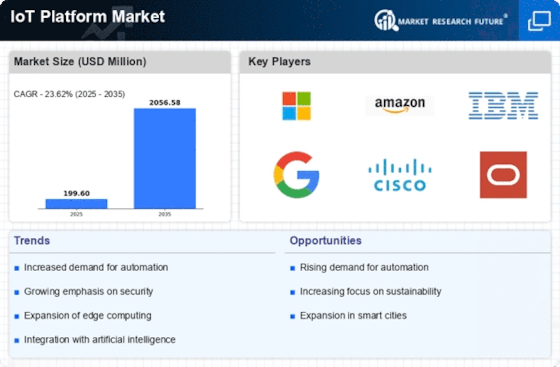Iot Platform Size
IOT Platform Market Growth Projections and Opportunities
The IoT (Internet of Things) platform market is experiencing dynamic growth, fueled by the widespread adoption of connected devices and the increasing need for seamless connectivity and data integration. At the core of IoT implementation, these platforms serve as the backbone, enabling the management, analysis, and communication of data generated by interconnected devices. The market dynamics of IoT platforms are driven by several key factors.
Firstly, the proliferation of connected devices across various industries is a primary driver of the IoT platform market. From smart homes and wearables to industrial sensors and healthcare devices, the IoT ecosystem is expanding rapidly. As more devices get connected, the demand for robust platforms that can handle the massive influx of data and facilitate efficient communication between devices becomes crucial. This has led to a surge in the adoption of IoT platforms by businesses seeking to harness the power of connected technologies.
Secondly, interoperability is a key factor shaping the dynamics of the IoT platform market. With devices and sensors manufactured by different vendors, ensuring seamless communication and data exchange is essential. IoT platforms play a pivotal role in providing standardized protocols and interfaces, allowing disparate devices to work together cohesively. Interoperability not only enhances the overall efficiency of IoT implementations but also encourages the development of a more diverse and collaborative IoT ecosystem.
Thirdly, the evolution of edge computing has significantly impacted the IoT platform market. Edge computing involves processing data closer to the source of generation rather than relying solely on centralized cloud servers. This approach reduces latency, enhances real-time processing capabilities, and alleviates bandwidth constraints. As a result, IoT platforms are adapting to incorporate edge computing capabilities, allowing businesses to deploy more efficient and responsive IoT solutions.
The competitive landscape of the IoT platform market is characterized by the presence of established technology giants, cloud service providers, and niche players offering specialized solutions. Major players in the market are continuously innovating to enhance their platforms with features like advanced analytics, security protocols, and scalability. Simultaneously, startups are emerging with unique offerings, focusing on specific industry verticals or addressing niche requirements within the IoT ecosystem, contributing to a diverse and competitive market.
Security concerns are another critical aspect shaping the dynamics of the IoT platform market. As the number of connected devices increases, so does the potential vulnerability to cyber threats. Ensuring the security of data transmitted between devices and stored on IoT platforms is paramount. Market dynamics are influenced by ongoing efforts to develop robust security protocols and solutions that safeguard the integrity and confidentiality of IoT data.
Furthermore, regulatory compliance and standards play a pivotal role in shaping the IoT platform market. Governments and industry bodies are actively working on establishing guidelines and standards to ensure the ethical use of IoT data, protect consumer privacy, and address security issues. Compliance with these regulations is a key consideration for businesses when selecting IoT platforms, influencing market dynamics and driving the development of platforms that adhere to global standards.



















Leave a Comment